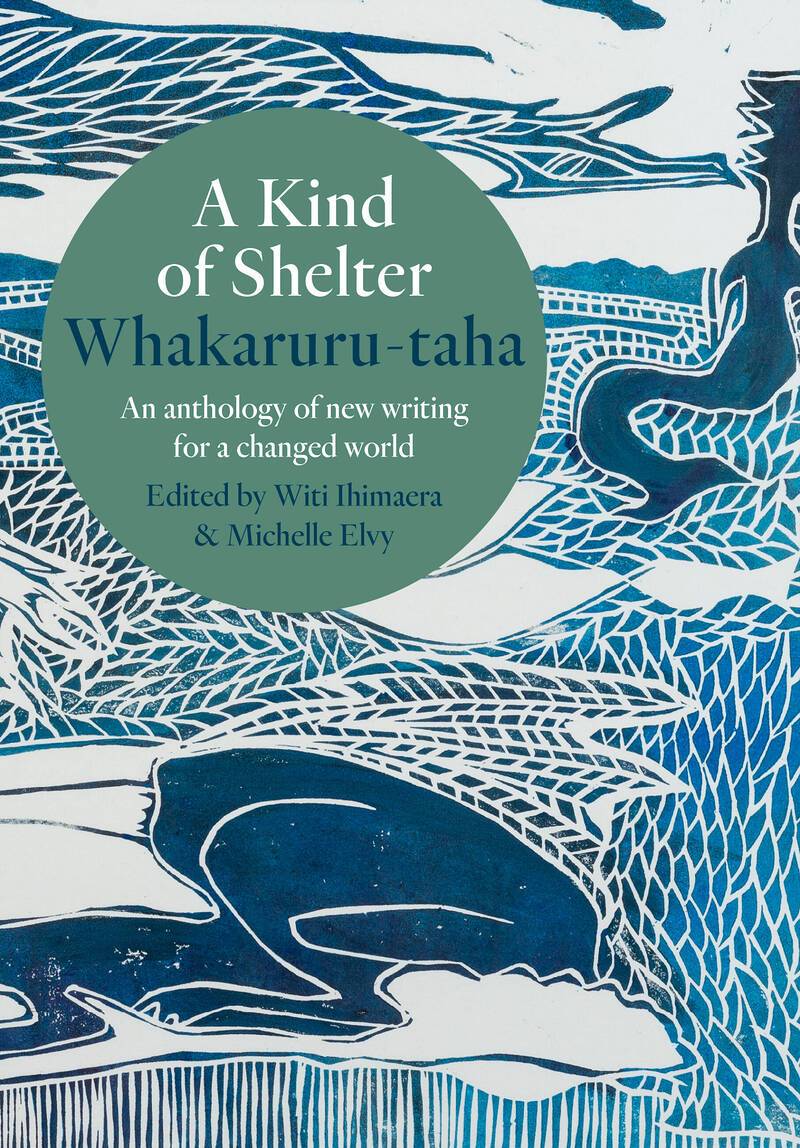Earlier this year, Stuff published Tusiata Avia’s poem, ‘The 250th anniversary of James Cook’s arrival in New Zealand’, part of her award-winning 2020 collection The Savage Coloniser Book. Stuff described Avia’s poetry as often ‘objectively hilarious’, yet for some readers, the poem was offensive, decried as ‘hate speech’. Complaints were made to the Media Council. One compared the poem to ‘Isis beheading videos’; another said the poem could be seen as ‘an incitement to murder’. These complaints ‘against art because it caused offence’ were not upheld.
Readers exhausted by the online vitriol directed at Avia may find in A Kind of Shelter Whakaruru-taha a space of cultural calm.
Here, 76 creative thinkers – poets and fiction writers, anthropologists, biologists, musicians and visual artists, and more – gather at a hui in the shelter, which you might visualise as a magnificent cave-like dwelling or meeting house.
Edited by Witi Ihimaera and Michelle Elvy, this anthology assembles thought-provoking work that explores what ‘is this world we live in, and where is it heading?’
We hope the contents can be thought of as a dialogue, from writer to writer, and between the written word and the visual works included here: story and poem weave together thematically and pull at the edges; fiction and non-fiction ponder climate change and political urgencies, historical weights and cultural challenges, family structures and race and class. Painters and photographers suggest realities and un-realities.
Writers from Aotearoa include poet laureates past and present – Cilla McQueen, Ian Wedde, Vincent O’Sullivan, Selina Tusitala Marsh, David Eggleton, Chris Tse – and writers that range from emerging (Cybella Maffitt, Emma Barnes) to leaders (Patricia Grace, Ben Brown) and a range of insightful contemporary voices: Mohamed Hassan, Lana Lopesi, Anne Kennedy, Faisal Halabi.
Some, like Alison Wong and Nina Mingya Powles, live overseas. The whakataukī that introduces part one of the book speaks to bringing ‘distant horizons closer’, and this also means international contributors who write from the context of Hawai‘i, Japan, South Africa, Brazil, Italy, Rwanda, Spain, Sri Lanka, Ghana, Singapore, the United States and Sāmoa.
The anthology is divided into three parts, interspersed with colour plates of photography and other visual art. Dialogue crosses these sections, from ‘the curving sides of Papatūānuku’s body’ at the book’s beginning to Lisa Reihana’s Papatūānuku and Rūaumoko late in part two. Some of the questions and issues raised in A Kind of Shelter are metaphorical. James Norcliffe’s poem ‘The four limitations’ is set in a rehearsal space and riffs on the nature of perceived constraints:
Is it gravity? hazarded one student, who wished to dance to the moon.
Is it light? asked another, who feared the darkness.
Is it imagination? asked one who dreamed wonder and wondered dreams
Is it movement? Mobility? asked another, frightened of arthritis.
Is it the audience? asked the one who desired fame.
Others are more concrete, like the kōrero between Louise Umutoni-Bower and Apirana Taylor, which explores the nature of historical wounds. Taylor states succinctly: ‘The sadness is that there’s only one race, and it’s the human race.’ Umutoni-Bower is a Rwandan writer and the founder of Huza Press, which supports contemporary literature and literary events throughout Africa. She talks of the scars of violence and how pain is passed on to successive generations.
There are children who were not even alive at the time, because it’s been 28 years since the [Rwandan] genocide. It’s interesting to see these children, who are now teenagers, walking around with the same wounds, the same perspectives, and the same view on the world. And you wonder: How do you deal with some of these issues?
Relationships – between generations and communities, within families – are explored in a number of contributions. In Emma Espiner’s essay ‘On parenting during the zombie apocalypse’, we learn that her young daughter ‘speaks te reo Māori so well that she has decided she’s too good to speak to her barely proficient parents. Her school exercise books are full of stories in our Indigenous language, carefully wrought in pencil in a child’s large, expressive handwriting.’
In ‘Overturning motherhood’, a conversation with Australian writer Catherine McNamara, Ghazaleh Golbakhsh discusses the life of Iranian poet Forugh Farrokhzād. She ‘left her first husband for a famous filmmaker, and her husband would not allow her to see her son. She had a breakdown, attempted suicide and was admitted into an asylum to undergo electric shock “therapy”.’
Alice Te Punga Somerville explores the issues of generational disruption as colonisation unravels:
When we find out more about our expansive multi-directional pasts, we realise that what we hold in our hands as we face āpōpō is not an authorised copy of cultural To-Do lists or bullet points. We don’t need to insecurely bleat about Making Aotearoa Great Again, but nor do we need — or desire — to abandon the lines that connect.
Many of the contributions here are spaces of connection and investigation. The final creative work in the book is the poem ‘Attend’ by Vincent O’Sullivan; it’s final word is ‘listening’.
If there is a singular characteristic of the 2020s, it is that we live at a time of rapid uptake and iterations of technologies, from vaccinations to AI. COVID lockdowns and isolation bubbles — evoked with precision by Patricia Grace in her short piece ‘Whakarongo’ — feel somewhat remote thanks to a vaccination programme that has attenuated the effects of infection. AI has already caused disruption in creative industries, upturning the dissemination of knowledge through both visual and written formats. David Eggleton may have had AI in mind when he wrote his poem ‘Tomorrow’: ‘Tomorrow, more bafflegarb, gobbledegook, bumpf, / officialese, paradiddles and blatteration’.
In time, A Kind of Shelter should be a multi-faceted milestone to be contemplated from the distant outpost of our futures perspectives. We might be amazed, when we look back through the tunnel of time, at the types of futures we were anticipating back then.



